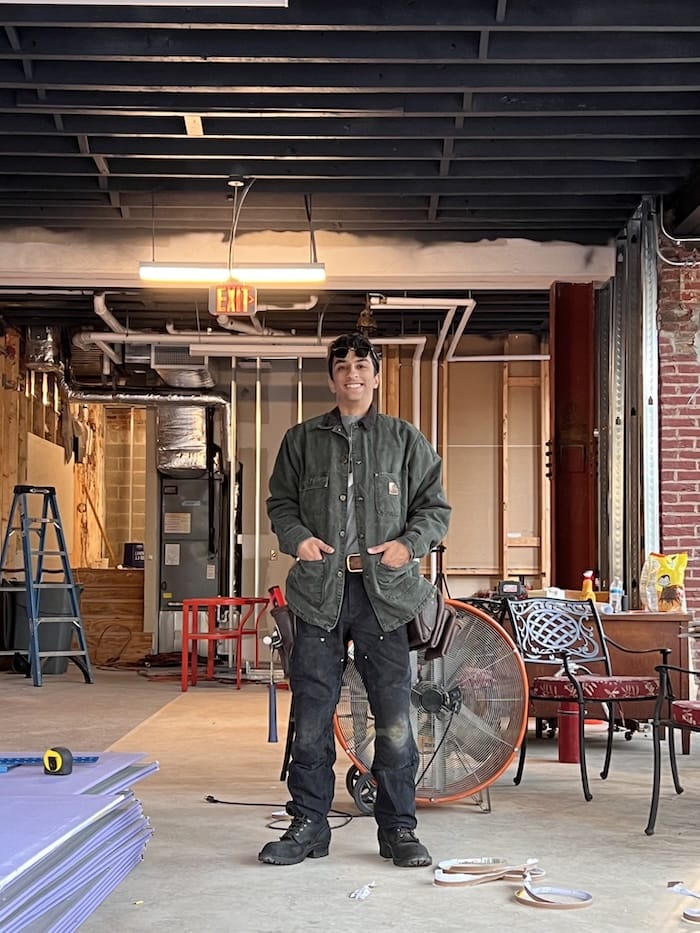VIRGINIA – Mohammad Chanaa still remembers the quiet that fell over George Mason University in March 2020. Lecture halls went dark, the biology lab where he had been mapping bacterial genomes shut its doors, and the only noise left on campus came from the constant ping of news alerts.
Those alerts – filled with images of exhausted nurses and ambulance sirens – changed the course of his life forever.
“I had always pictured medicine in a classroom context, cell diagrams and late-night study sessions,” Mohammad Chanaa said in a recent interview. “But the pandemic showed me medicine in real time, people losing breath and minutes making the difference.”
The 21-year-old junior had been shadowing physicians and aiming for medical school. Watching the crisis from his parents’ dining room felt wrong, so he applied to a volunteer fire department in Northern Virginia and began emergency medical technician training.
Online lectures filled his days, drills filled his nights, and by summer he had logged hundreds of hours on ambulances as COVID-19 swept through the region. “It was the first time I saw how small acts can restore dignity,” he said. That revelation turned an academic plan into a lifelong mission: meet people where they hurt, treat them as whole human beings, and never forget the privilege of being present on their worst days.
Mohammad Chanaa Leads With Heart
Mohammad Chanaa’s shift from flashing lights to fluorescent clinic ceilings might seem drastic, yet the two worlds feel linked. During an early morning hospital transfer, a cardiologist noticed the EMT’s calm briefing style and suggested an opening at a busy practice in Fairfax. Chanaa joined as a technician, quickly mastering EKG hookups and discharge protocols.
“I realized hearts don’t heal the moment a patient leaves the hospital,” he said. “Someone has to guide them through medications, lifestyle changes, and the fear that their chest could tighten again.” Two years later, the practice’s medical director promoted him to clinical lead, placing him in charge of seven medical assistants and the inventory that keeps ultrasound rooms running smoothly.
His off-duty life mirrors that blend of precision and empathy. Now a deputy chief at his volunteer firehouse, he teaches recruits to view every emergency through a human lens. “We all love adrenaline,” he said, “but people remember kindness more than sirens.”
Building a Multifaceted Identity
Beyond medicine, Mohammad Chanaa is also a skilled photographer whose work spans a decade. His online gallery features raw, unedited images captured on film since 2015.
“I’ve never been interested in perfection,” he says. “My photos are a reflection of real life, not just curated highlights. That’s how I try to show up in every space—authentically.”
Chanaa, who was born and raised in Virginia, says his journey has always been about layers. As a George Mason University graduate, he studied Biology, Microbiology, and Sociology—disciplines that trained both his hands and heart.
“My sociology classes taught me how systems shape access to care. Biology taught me how the body works. Together, they made me want to be the kind of provider who doesn’t just treat symptoms, but understands the story behind them.”
Many of his other favorite photos were taken during hikes and nature travels. Mountains, forests, deserts and remote trails make up the bulk of his collection, reflecting a deep reverence for quiet beauty and the restorative power of the outdoors.
“Nature teaches you to be still,” Chanaa said. “It grounds me, the same way medicine and service do.”
A Calling Clarified by Crisis
Like many in the medical field, Chanaa’s path wasn’t linear. He once imagined becoming a doctor. However, when the pandemic brought emergency medicine into sharp focus, he realized how much healing occurs before a patient ever reaches an exam room.
“Initially, I thought impact meant status, a title, a white coat,” he said. “Now I know that impact comes from consistency. It’s about being the person who follows up. Who remembers your name. Who holds space.”
Chanaa began volunteering with fire and EMS services while finishing his degree. That hands-on experience changed how he viewed healthcare entirely.
“Riding ambulances taught me something medical school never could: how to be calm in chaos,” he said. “And more importantly, how to be kind in it.”
He later transitioned into outpatient cardiology, where his role involves everything from patient intake and education to managing complex post-discharge cases. His leadership there—both operational and interpersonal—earned him respect and influence.
A Leader Shaped by Service
In 2022, Chanaa completed a grueling nine-month fire academy program, attending twice-weekly training sessions that stretched well past midnight. He did so while working full time, fasting for Ramadan, and dealing with personal upheaval.
“It was the hardest thing I’ve ever done,” he said. “There were nights I didn’t sleep, days I didn’t eat enough. But I never missed a class.”
He graduated as valedictorian.
That season taught him discipline, endurance, and humility. As an academy instructor today, he emphasizes those values to each new cohort.
“I tell my students that fire trucks don’t just carry water. They carry people’s trust. And we have to earn that every call.”
Chanaa is also on the executive board of his fire department, helping shape policy, mentoring new volunteers, and ensuring readiness. He sees leadership not as a position, but a responsibility.
“Every decision we make affects lives,” he said. “We have to make sure our culture values compassion just as much as competence.”
Looking Ahead with Purpose
Now 26, Mohammad Chanaa is preparing to take the next leap in his career. He’s applying to Physician Assistant programs, drawn to the role’s blend of autonomy, patient continuity, and team-based care.
“I used to think doctors did it all,” he said. “But I’ve learned that PAs often see patients more frequently. They follow them, advocate for them, become part of their story.”
To support his goal, Chanaa continues to work full-time, volunteer on weekends, and teach academy classes in the evenings. It’s a demanding pace, but one he’s embraced.
“I used to chase success,” he said. “Now I chase peace. If I can go to sleep knowing I helped someone—really helped—that’s enough for me.”
When asked what he’d tell his younger self, he pauses. “Don’t be afraid to think big,” he said. “I spent too long playing small, afraid of failing. But it’s in those hardest seasons—when you’re stretched thin and doubting everything—that God’s often preparing you for your purpose.”
That conviction, born out of crisis and cultivated through community, continues to guide him. Whether he’s responding to a fire call, managing patient care, or framing a shot through his camera lens, Chanaa returns to the same guiding truth:
“Compassion is a choice. And I choose it every day.”
The Editorial Team at Healthcare Business Today is made up of experienced healthcare writers and editors, led by managing editor Daniel Casciato, who has over 25 years of experience in healthcare journalism. Since 1998, our team has delivered trusted, high-quality health and wellness content across numerous platforms.
Disclaimer: The content on this site is for general informational purposes only and is not intended as medical, legal, or financial advice. No content published here should be construed as a substitute for professional advice, diagnosis, or treatment. Always consult with a qualified healthcare or legal professional regarding your specific needs.
See our full disclaimer for more details.








